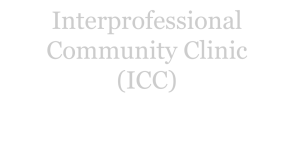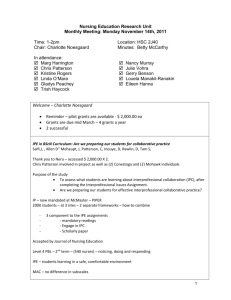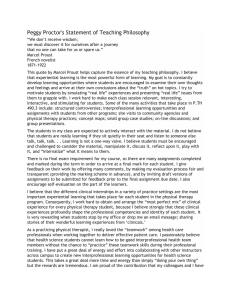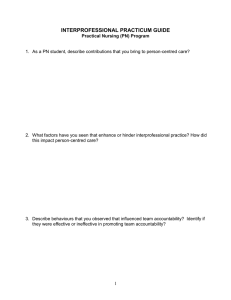Interprofessional Collaboration
advertisement
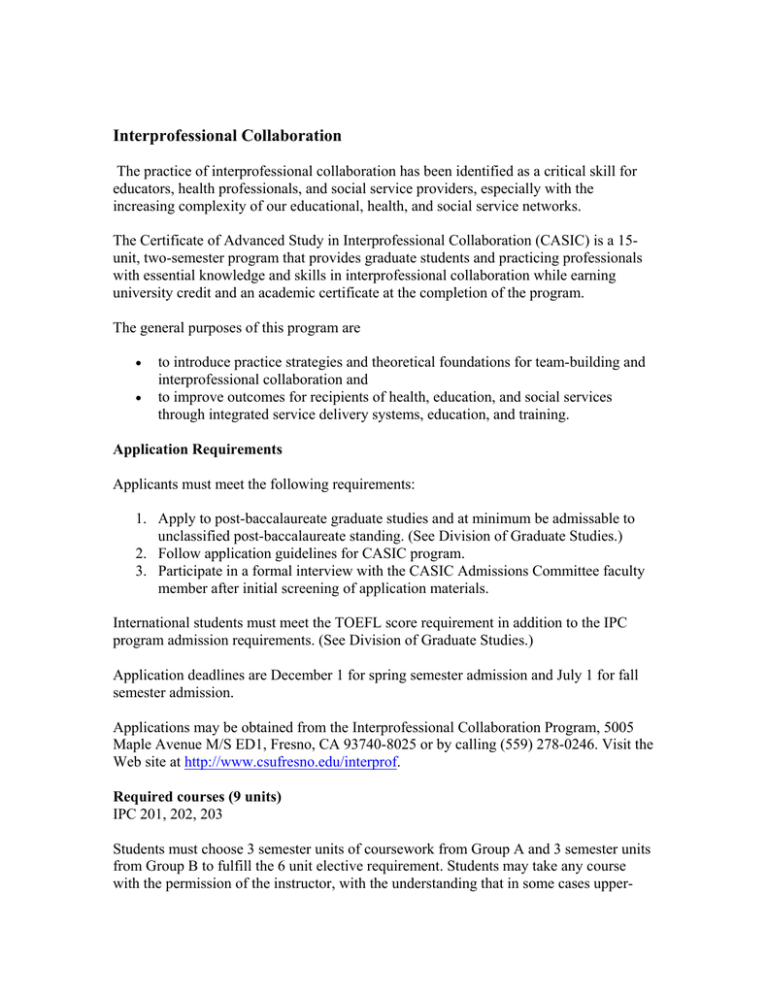
Interprofessional Collaboration The practice of interprofessional collaboration has been identified as a critical skill for educators, health professionals, and social service providers, especially with the increasing complexity of our educational, health, and social service networks. The Certificate of Advanced Study in Interprofessional Collaboration (CASIC) is a 15unit, two-semester program that provides graduate students and practicing professionals with essential knowledge and skills in interprofessional collaboration while earning university credit and an academic certificate at the completion of the program. The general purposes of this program are • • to introduce practice strategies and theoretical foundations for team-building and interprofessional collaboration and to improve outcomes for recipients of health, education, and social services through integrated service delivery systems, education, and training. Application Requirements Applicants must meet the following requirements: 1. Apply to post-baccalaureate graduate studies and at minimum be admissable to unclassified post-baccalaureate standing. (See Division of Graduate Studies.) 2. Follow application guidelines for CASIC program. 3. Participate in a formal interview with the CASIC Admissions Committee faculty member after initial screening of application materials. International students must meet the TOEFL score requirement in addition to the IPC program admission requirements. (See Division of Graduate Studies.) Application deadlines are December 1 for spring semester admission and July 1 for fall semester admission. Applications may be obtained from the Interprofessional Collaboration Program, 5005 Maple Avenue M/S ED1, Fresno, CA 93740-8025 or by calling (559) 278-0246. Visit the Web site at http://www.csufresno.edu/interprof. Required courses (9 units) IPC 201, 202, 203 Students must choose 3 semester units of coursework from Group A and 3 semester units from Group B to fulfill the 6 unit elective requirement. Students may take any course with the permission of the instructor, with the understanding that in some cases upper- division and graduate courses often have their own prerequisite requirements, which must be met. In some disciplines enrollment is restricted to cohorts of students who have been admitted to a specific graduate program. The following is a list of acceptable electives. Three units must be taken from each group. Electives (6 units) Group A: AFAM 144; EHD 108; SOC 162, 168; COMM 108, 164, 266; COUN 201; CRIM 134; ERF 140; PSYCH 175, 178, 278; SPED 155; SWRK 135, 140, 216, 244 Group B: EHD 109; COMM 167, 168, 268; COUN 202; EAD 264, 265, 275; GPA 210, 240; NURS 225; PHTH 231, 232; PSYCH 277, 279; SPED 219; SWRK 141, 247 COURSES Interprofessional Collaboration (IPC) 201. Interprofessional Collaboration Foundations (3) Prerequisite: graduate standing or permission of the instructor. Examination of beliefs and biases affecting professionalization and discipline specific culture. Group process and team building skills, including active listening, conflict mediation, and cultural competence. Principles of integrated service delivery models of team practice in a multicultural and interdisciplinary context. 202. Integrated Service Delivery Models (3) Prerequisite: admission into the CASIC program. Analysis of local community health, education, and economic challenges. Looks at issues in working with families and communities, including access and equality. Covers organizational development and systems that build interagency partnerships for collaborative practice. Measures outcomes of integrated service delivery programs. 203. Practicum in Interprofessional Collaboration (3) Prerequisite: admission into the CASIC program. Thirty hours of supervised practice in an agency using an integrated service delivery model. This will be supplemented by a weekly two-hour seminar on campus that provides a forum for reflection, analysis, and synthesis of experiences and observations.
